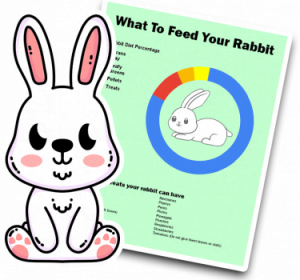
Rabbits make lovely pets, and they are cute, cuddly, and fun. However, like any other pet, rabbits are also susceptible to various diseases. Knowing about these diseases, their prevention, symptoms, and treatment are vital to ensure the good health of your furry friend.
Rabbit Hemorrhagic Disease (RHD) is a highly contagious viral disease that can cause liver failure and internal bleeding. It is caused by the calicivirus, and there are two strains: RHDV1 and RHDV2. The symptoms of RHD include loss of appetite, lethargy, fever, bleeding from the nose or mouth, and sudden death. There is no cure for RHD, and vaccination is the only way to prevent it.
Myxomatosis is a viral disease that can cause swelling, pus-filled eyes, fever, and lethargy. It is transmitted by fleas, mosquitoes, and direct contact with infected rabbits. The symptoms of myxomatosis can vary from mild to severe, and there is no cure. Vaccination is the best way to prevent myxomatosis.
Pasteurella multocida is a bacterial infection that can cause abscesses, pneumonia, and septicemia. The symptoms of pasteurella multocida include fever, lethargy, loss of appetite, respiratory distress, and abscesses around the face, neck, or limbs. Antibiotics are the treatment of choice, and good hygiene and sanitation can help prevent the infection.
E.cuniculi is a parasitic infection that can affect rabbits’ kidneys, liver, brain, and eyes. The symptoms of E. cuniculi include head tilt, seizures, cataracts, incoordination, and urinary incontinence. There is no cure for E. cuniculi, and treatment aims to manage the symptoms.
Snuffles, also known as Pasteurellosis, is a bacterial infection that can cause respiratory problems, pneumonia, and abscesses. The symptoms of snuffles include sneezing, nasal discharge, lethargy, loss of appetite, and difficulty breathing. Antibiotics and good hygiene can help prevent and treat snuffles.
Ear mites are a common parasitic infection that can cause itching, scratching, head shaking, and discharge in rabbits’ ears. The symptoms of ear mites include redness, inflammation, and crusting around the ears. Ear mite treatment includes ear cleaning, medication, and good hygiene.
Flystrike is a potentially life-threatening condition that occurs when flies lay their eggs on rabbits’ dirty fur, wounds, or soiled areas. The larvae hatch, burrow into the skin, and cause severe tissue damage and infection. The symptoms of flystrike include lethargy, loss of appetite, and discharge around the affected area. Good hygiene, regular grooming, and insect control can prevent flystrike.
Don’t think that your pet can’t get sick. And since they can’t tell you what they feel, you must be sensitive to the signs and symptoms you notice when raising rabbits.
Animals get sick, too, sometimes even more often than people do. Rabbit diseases and illnesses, like other animal sicknesses, are not apparent, so they are often ignored.
The first thing to do is give your rabbit some fluids. Rabbits are generally gentle creatures, so you don’t have to worry about biting and scratching.
Use a dropper so the rabbit won’t be overwhelmed. Don’t force your rabbit; you might cause more harm to him than help.
Let it rest while you observe for more signs of rabbit illness. Give it fluid from time to time. If this doesn’t work, don’t wait for a few days before you take it to the vet.
Take the rabbit to a pet clinic immediately, especially if you notice signs of injury. The vet will prescribe medications for your rabbit, which you must give your bunny religiously.
Rabbit illness doesn’t usually last long; it often takes about half a day or the whole day at most before it starts to eat again.
Yes, rabbits do sneeze. This doesn’t necessarily mean they are poorly. This could be as simple as dust in their hay, allergies to the type of hay, air fresheners, or even cigarette smoke.
If your rabbit is sneezing, there’s no harm on checking their nose to see how bad the sneeze is. Rabbits can only breathe through their nose, so checking their airways are clear is perfect.
If your rabbit has regular discharge from their nose, that is a sign to take them to a vet as if this is left without resolution, it can lead to long-term damage.
This depends on the level of shaking, but some rabbits daydream and nap whilst awake, leading them to look like they’re shaking or rocking back and forth.
If your rabbit breathes very fast, this can sometimes be due to exertion of energy. If your rabbit is shaking, check the temperature of their ears, and check they’re responsive and breathing clearly.
Some of the common causes of a trembling rabbit can include fear, stress, and nervousness. These are commonly paired with thumping and grunting if they are unhappy.
If your rabbit is incredibly hot, they make be breathing quickly due to dehydration or struggling with the heat. There are a few solutions to this. The main one is to apply cold misty water around your rabbit simply.
Before determining that your rabbit has ear mites, it’s worth mentioning that one of the prevalent issues with rabbits is that they are prone to ear problems.
Small pockets of dirt can cause common infections, which require regular antibiotics from your vets and aren’t typically an issue.
The issue comes when a parasite called Psoroptes Cuniculi (Ear Mites) causes infection as this should be seen urgently by a vet.

By entering your email address you agree to receive emails from Cottontailclub. We'll respect your privacy and you can unsubscribe at any time.